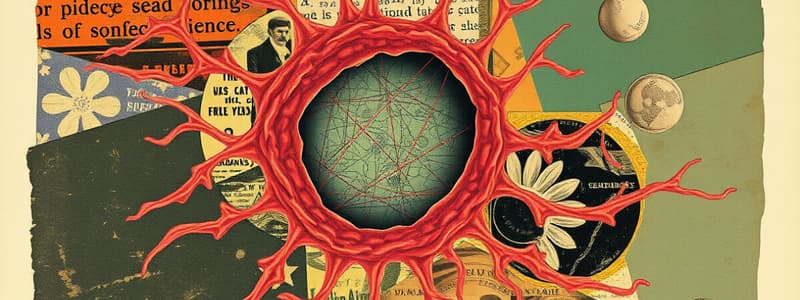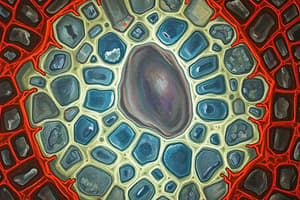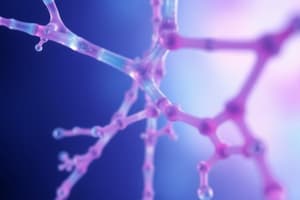Podcast
Questions and Answers
What is the basic unit of all forms of life?
What is the basic unit of all forms of life?
Cell
What does the Cell Theory state?
What does the Cell Theory state?
- Cells are the basic unit of structure and function in living things 2. All living things are composed of cells 3. New cells are produced only from existing cells
What do all cells have?
What do all cells have?
Cell membrane, DNA, and Cytoplasm
What are the two types of cells and what is the difference between them?
What are the two types of cells and what is the difference between them?
How are cells categorized into the two groups?
How are cells categorized into the two groups?
What organelles are connected to protein?
What organelles are connected to protein?
What are microtubules used for?
What are microtubules used for?
When was the first microscope used to observe living things?
When was the first microscope used to observe living things?
What is the function of lysosomes?
What is the function of lysosomes?
Which organelle captures energy from sunlight?
Which organelle captures energy from sunlight?
What structure helps to organize cell division in animal cells?
What structure helps to organize cell division in animal cells?
The _________ is a protective barrier from the outside environment.
The _________ is a protective barrier from the outside environment.
Match the following terms with their definitions:
Match the following terms with their definitions:
Flashcards are hidden until you start studying
Study Notes
Cell Basics
- Cells are the fundamental units of all forms of life.
- Cell theory defines that all living organisms are composed of cells, which serve as the basic structure and function units, and that new cells arise from existing ones.
Cell Structure
- Cell Membrane: A thin, flexible barrier regulating entry and exit for nutrients and waste.
- Nucleus: The control center containing DNA, with double membranes and pores for material exchange.
- Cytoplasm: Gel-like fluid surrounding organelles, located outside of the nucleus but within the cell membrane.
- Organelles: Specialized structures within eukaryotic cells that perform specific functions.
Cell Types
- Eukaryotes: Cells with a nucleus and membrane-bound organelles; examples include all organisms except bacteria.
- Prokaryotes: Unicellular organisms without a nucleus; DNA is located in the cytoplasm; examples include bacteria.
Organelles and Their Functions
- Ribosomes: Sites of protein synthesis, found in the cytoplasm or on rough ER; produced in the nucleolus.
- Endoplasmic Reticulum (ER): Network for transporting materials; divided into rough (with ribosomes) and smooth (without ribosomes).
- Golgi Apparatus: Modifies, sorts, and packages proteins for storage or export; known as the packaging center.
- Mitochondria: Produce energy by converting chemical energy from food; have inner membrane folds called cristae to increase surface area.
- Chloroplasts: Found in plant cells, capturing sunlight energy and converting it to chemical energy; contain chlorophyll.
- Lysosomes: Contain enzymes for digesting biomaterials; referred to as the "suicide sac" for their role in breaking down waste.
- Vacuoles: Storage organelles; central vacuole in plant cells holds water and other substances for structure.
Cellular Processes
- Osmosis: Movement of water across a selectively permeable membrane, driven by concentration differences.
- Diffusion: Particles move from areas of high concentration to low concentration, facilitating passive transport.
- Homeostasis: Maintaining a stable internal environment despite external changes, crucial for organismal health.
Tissue and Organ Levels
- Tissues: Groups of similar cells performing specific functions.
- Organs: Structures composed of several types of tissues working together for related functions.
- Organ Systems: Groups of organs collaborating to perform broader biological functions.
Microscopic Discoveries
- The first microscope was utilized to observe living organisms in the mid-1600s, leading to groundbreaking discoveries in biology.
Additional Concepts
- Selectively Permeable Membrane: A property allowing certain substances to pass while restricting others, critical for cellular function.
- Cytoskeleton: A network of protein filaments giving support, shape, and movement capabilities to a cell; consists of microfilaments and microtubules.
- Microtubules: Hollow structures involved in cellular movement and division, including components of cilia and flagella, centrioles, and spindle fibers.
This comprehensive overview covers essential concepts and functions regarding cell structure and dynamics, giving a solid foundation for further study in biology.
Studying That Suits You
Use AI to generate personalized quizzes and flashcards to suit your learning preferences.




